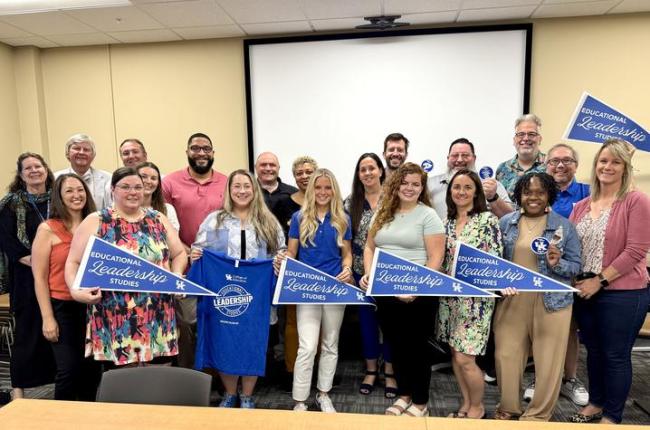Doc Week builds community among UK’s educational leadership students
Each summer, students in the University of Kentucky’s fully online Ed.D. and Ph.D. in educational leadership programs gather on campus for Doc Week.
From cookouts with faculty to focused research discussions, Doc Week gives doctoral students a chance to strengthen the professional and personal bonds they’ve built online throughout the year.
“I loved every moment of learning and exchanging in the network,” said Ph.D. student Bethany Yance. “I met with many of my faculty members, who helped me rethink my research foundation, which I genuinely appreciate.”
As one of the first fully online doctoral programs in educational leadership in the nation, UK’s program is known for building strong, lasting connections between remote learners and faculty.
Yance, who is focused on rural deaf education, said the online format is essential for her busy schedule. She is using the program to further research in deaf education and address barriers to sign language that many students face in rural deaf education.
“My cohort is amazing and inclusive,” she said. “I am deaf, and they communicate clearly through notes and text messages. Everyone has unique insights to share, and I enjoy learning from their perspectives on various topics.”
Students in the program come from a variety of career backgrounds and geographic locations, from across the U.S. and internationally.
For Jenny Palacios, being a Ph.D. student in educational leadership has been pivotal.
“This program has transformed the way I think, lead and connect,” she said.
Palacios found Doc Week to be energizing.
“It provided concentrated time for professional development, personalized mentorship and iterative research feedback that helped me sharpen my academic goals,” she said.
Palacios, who works in higher education, said the relationships built during Doc Week carry forward, even after returning to remote learning.
“We maintain consistent contact through group chats, virtual study sessions and collaborative projects with faculty,” Palacios said.
Interacting with the cohort, articulating ideas, engaging in scholarly discourse and applying theory to real-world organization dynamics, has enhanced Palacios’ professional life.
“I now lead with greater intention, drawing from shared wisdom and a deepened sense of purpose,” she said.
Students say they appreciate that courses in the program are designed to connect theory to practice.
For Ed.D. student Kimberly Slifer, an assistant principal, that relevance is key.
“Every course allows us to draw from our daily work lives for the content we write about,” she said. “When I’m thinking about different types of leadership, I collaborate with my classmates to explore how these ideas play out in real school settings.”
Slifer said she often walks away from discussions feeling newly energized.
“I get inspired by others to try new strategies, and we empower each other to push through difficult scenarios in our work lives,” she said.
Her dissertation topic — whether the physical condition of school buildings correlates with student achievement — took shape during Doc Week.
“As classmates, we openly bounce ideas off one another to strengthen our dissertation topics and bring our passions to life,” she said. “I also learned so much by working and problem solving in-person with the professors. They are so helpful and make you feel comfortable asking questions.”
Slifer said the opportunity to build relationships during Doc Week helped deepen her connection to the program.
“We are going to be together for a couple years and having that support system is essential,” she said.

